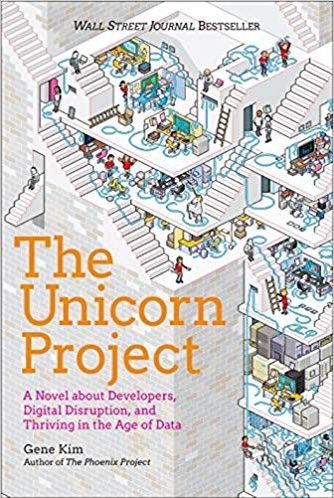The Unicorn Project
30th of August, 2020I recently read The Unicorn Project by Gene Kim. This came as a recommendation from my manager at work as an accurate portrayal of life inside a bureaucratic software company. I definitely have experience in many of those (including 2 that this story’s fictionalization is based on) and could judge for myself. After a brief detour through another book about a software company loosely related to unicorns, which I may write about later, that I found when searching for this one I dove in.

The book follows the path of one Maxine Chambers during a portion of her career at a fictional Auto Parts manufacturer and retailer. The book is apparently a sorta-sequel to another book, The Phoenix Project, which I’ve not read. That works titular project is a large part of the “plot” of The Unicorn Project. Scare quotes because while this book is fiction, I wouldn’t call it prose. This book feels like a not uninteresting way to collect a set of anecdotes and management aphorisms and post mortems into a narrative.
Maxine is portrayed as an ultra competent back end/dev ops engineer. She’s the architect of a hugely beneficial and highly successful project at her company to revolutionize the way the back office is run. After a production incident that causes a number of employees to not receive their paychecks, Maxine is made a scapegoat. As “punishment” Maxine is made to switch divisions and go work on The Phoenix Project for a while. I nearly quit reading the book early on because of it’s frequent detours into keyword spewing, Ready Player One-esque buzzword tirades describing the various technologies Maxine is experienced and interested in.
The narrative takes off from there as Maxine encounters various bureaucratic nightmares that will be all too familiar to many. Maxine is often discouraged. She finds herself among a set of engineers who, like her, care deeply about their work and want to make a difference. What follows is Maxine’s, sometimes unsuccessful, attempts to navigate corporate pot holes and bureaucracy and politics.
I wish that this book came with a disclaimer. “The situations described in this work are contrived and idealized. The solutions presented, while based on anecdotes, should not be considered advice. Your results may vary” is what I imagine such a disclaimer might sound like. I don’t mean to be too much of a pessimist. I just find the resulting sum of the anecdotes stitched together in this work to be less than credible. I want to stress that I did quite enjoy reading this story, and would even recommend it. Just don’t take it too seriously.
A minor criticism would be that there are a few references and details about Maxine’s family and home life. She has a husband, 2 kids, and at least 1 dog. I thought that the inclusion of these details to be odd. Mostly because they’re never more than a superficial veneer in the story. Maxine often works late. Or she is spending after hours time with her fellow “rebels” at a bar near their work. Never does Maxine wrestle with the challenges of a work/life balance. Never does she have to juggle sick kids or school pick ups or any of the other myriad of issues that challenge working parents every day. I think it’s fine if that’s not something that the author wanted to write a story about, but then it seems like it would have made more sense to leave those details out entirely. Instead, we get Maxine’s almost Hallmark movie-like home life that is never anything but ideal.
Another criticism, related to the above, is that the author made the intentional choice to make the main character a woman; but then made the intentional choice to not include any sort of conflicts stemming from gender bias in the corporate world. As a cis white male, I’m not exactly an authority on what should be included, but I’m sure it should be more than nothing. There’s a missed opportunity to give readers who are victims of that type of bias some stories on how to approach dealing with it. Also the opportunity to give readers who may not realize they’re often the source of that bias a peek into what it feels and looks like to be the victim for once. The author was able to work in using functional programming concepts to simplify code and make it more reliable, they could have found a way to include a story about gender bias/discrimination.
My take on the book as a whole, is that it has a bit of an identity crisis, in a couple of different ways. It seems to want, in places, to be a story about abstract concepts that, when applied, can lead to better code, better work, and better products. But then at other times it wants to be super prescriptive (like the aforementioned functional programming detour) on how to succeed. It seems to want to be a realistic portrayal of life in the corporate world. But then is full of solutions to problems light on detail and feeling really contrived.
I don’t want to sound too critical, though. It was an enjoyable read and fairly light. Don’t expect it to change your life and you won’t be disappointed.